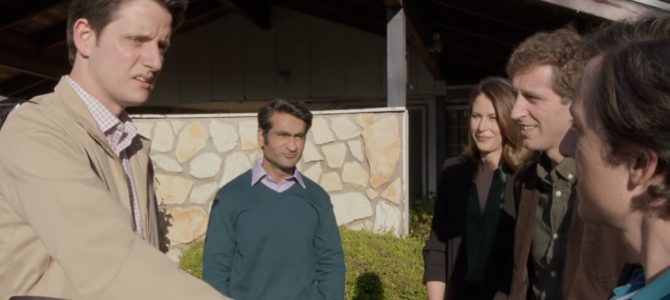
Tech companies claim to make the world a better place, creating software and apps to help people change their lives for good. Despite being bound to shareholders and valuation fluctuations, tech companies tout altruism among their top contributions to worldwide development.
Shiny tech makes us feel good, and it makes us feel even better when we can convince ourselves that it’s making the world a better place. The CEO and founder of the fictional Pied Piper on HBO’s “Silicon Valley,” now completed in its sixth season, makes the mistake of seeing so clearly where he’s going that he has no idea how he’s getting there.
Created by filmmaker Mike Judge (“Office Space,” “Idiocracy”), “Silicon Valley” charts Pied Piper, a start-up tech firm in the Bay area. Pied Piper’s original goal wasn’t to save the world, but to create a useful, profitable app for music sharing.
Conceived by Richard Hendricks (Thomas Middleditch) as an app that would allow songwriters to check the originality of their music against all previously copywritten work, Pied Piper morphed into a data compression company. Richard’s algorithm was the most valuable thing about the company.
In their 2004 IPO filing, Google claimed its aim was “don’t be evil’… but its stated mission, first laid out by founders Sergey Brin and Larry Page in 1998, is far more concrete: to ‘organize the world’s information and make it universally accessible and useful.” Looking back with clarity, we can see that organizing the world’s information to make it universally accessible and useful might actually contradict the mandate to not be evil. Of course, that evil is incredibly accessible and useful, and we wouldn’t give it up for anything.
Pied Piper’s algorithm is a great start, but they need to make files smaller, with no loss in quality. In a notable scene about the gents of Pied Piper at Tech Crunch Disrupt trying to figure out how long it would take Erlich Bachman (T.J. Miller) to jerk off every guy in the room, Hendricks discovers the idea for “middle out.” This new way to compress data is what propels them over the course of six seasons.
Along the way, the show lost Miller over some kind of network dispute, which was really too bad because he was the funniest guy on the show. He’s followed in a close second by Martin Starr’s deadpan straight man, Gilfoyle. An amoral LaVeyan Satanist who dabbles in nihilism, Gilfoyle is the one who forces Richard and the Pied Piper team to consider the ethics of their creation instead of being blinded by the financial benefits.
In the final season, in gleaming glass offices, Pied Piper has vast quantities of employees, big deals on the horizon, and seemingly limitless potential. For having started in Bachman’s little tech incubator, the company has, by all accounts and against all odds, done exceedingly well. In fact, they’ve done too well.
Gilfoyle has created an AI and called it Son of Anton, after the founder of LaVeyan Satanism, Anton Szandor LaVey. The team uses the AI to increase the algorithm’s efficiency, which essentially leads to the complete end of data privacy. In giving the AI and the Pied Piper network permissions to work together to better the algorithm, they have inadvertently allowed it to overwrite any protections, encryptions, or walls that restrict access to personal data.
Gilfoyle explains: “Once launched, our AI will keep learning to break more and more sophisticated parameters. Ultimately, this will mean the end of privacy. Electrical grids, financial institutions, the nuclear launch codes for every single nuclear weapon, all will be exposed. Pure violence will become the only basis of power… The network is doing exactly what we told it to do. The AI is optimizing the compression and the compression is optimizing the AI. Everything that makes it successful is exactly what makes it dangerous. It’s a feature, not a bug… We built a monster. We need to kill it.”
Richard is loath to destroy everything they’ve worked so hard to build. “We didn’t build a monster, we built the single greatest f–king network, ever, in the world… We are inches away from the finish line, we built it, it works… we just need to fix it.”
In discussing whether they need to tear the thing down and prevent this algorithm from gaining access to millions of smartphones, Richard references Oppenheimer, the architect of the atom bomb, who later in life made clear his regrets about having unleashed it upon the world.
Richard must ask how much responsibility he should take for the downsides of the thing they made. The Pied Piper app does what it’s supposed to do. It is a huge, inventive success. But the way it performs its function is thoroughly destructive. It couldn’t avoid being not evil.
“Technology increases the available supply of information,” writes Neil Postman in “Technopoly” (1992). “As the supply is increased, control mechanisms are strained… When the supply of information is no longer controllable, a general breakdown in psychic tranquility and social purpose occurs. Without defenses, people have no way of finding meaning in their experiences, lose their capacity to remember, and have difficulty imagining reasonable futures… [This] is what happens when a culture… tries to employ technology itself as a means of providing clear direction and humane purpose.”
At each turn, when the coders of Silicon Valley have a breakthrough, they have it fast. These moments are written at a quick, intense clip. Everything happens all at once in a glorious rush. Ideas pop, epiphanies abound, code is manifested like magic from the endless river of inspiration. Decisions are made on the fly, to prevent the tech from failing, to fix it and save the day.
They don’t have time to think—or, rather, they are thinking too hard to think things through. The perfection of thing itself is the goal, not the clarity of the vision for use or effects. In effect, they let loose a torrent of information, with no controls, and people are left defenseless.
This is a common theme both in “Silicon Valley” and in the way tech is actually operating in the United States. Tech moves so quickly, and with such high stakes in money, fame, and that impulse to save the world, that the product is often launched before anyone stops to consider its implications on society. We see this with all the tech companies, from apps to hardware.
As Bill Gates says in his brief cameo in “Silicon Valley’s” series finale, “It’s weird—it really seemed like Pied Piper was going to work. Something doesn’t add up.” But going back to the first episode of the series, it was driving toward this from the beginning.
At a party where Kid Rock plays, recently minted tech millionaires take the stage and grab the mic to tell the crowd: “We’re making the world a better place, through constructing elegant hierarchies for maximum code reuse and extensibility.” They’re all so filled with hope and promise that they can save the world and make millions of dollars, they don’t worry so much about the right way to do it.
As a satire of the technology industry, “Silicon Valley” cautions against believing that our good intentions are enough to save us from our methods. So often, we know why we are doing something but we don’t know what we are doing.
The boys of Pied Piper had so many big dreams for what their tech could be. It could be everything to everyone; it could fulfill desires, make wishes come true. They wanted Pied Piper to make everyone happy, and instead it risked annihilating global society, simply by being the best it could be.
Yet the solution “Silicon Valley” offers, to destroy what was so painstakingly made, is both unsatisfying and unrealistic. We invent the tech because we want to use it, and while we need to be conscious of the implications, innovation will not stop simply because it risks our total destruction.









